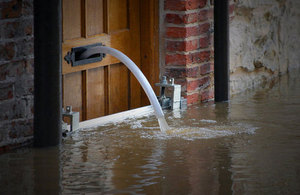Cleaning up safely following flooding
Public Health England (PHE) has produced guidance for the public on how to clean up their homes safely if they have been flooded.

Flooding
The guidance offers key advice for cleaning up after the floods, including:
- wear rubber boots, waterproof gloves and an apron for cleaning
- wash your hands thoroughly after each clean-up session and keep cuts or sores clean by using waterproof plasters to prevent infection transmission
- do not turn on gas or electrics if they may have been exposed to floodwater, to protect against electric shock, get them checked by qualified technicians
When you are drying out your property:
- ensure good ventilation
- never use petrol or diesel generators indoors, as their fumes can contain carbon monoxide
- heating, dehumidifiers and good ventilation can help dry out your home
Paul Cosford, director for health protection and medical director of PHE, said:
Research studies have shown that the infection risk following flooding is low and health risks associated are likely to be minimal. However, the public can reduce risks to themselves and their families by following public health advice and taking sensible precautions.
One of our key messages is to avoid using petrol or diesel generators to dry out your home as the exhaust fumes contain carbon monoxide which can kill. Good hand and food hygiene is also really important, to prevent contracting infections that can cause diarrhoea and vomiting.
For more information about flooding visit PHE’s dedicated web pages.
More advice on how to clean up your home safely is available in a leaflet produced by PHE.
Get answers to frequently asked health questions about flooding
More advice what to do before, during and after a flood is available in a leaflet produced by PHE in collaboration with the Environment Agency.
Read PHE’s advice on the psychological impacts of flooding.